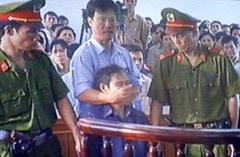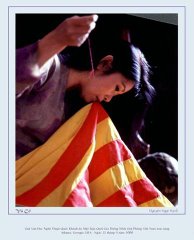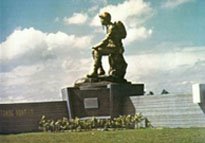
(CNSNews.com) - With Vietnamese President Nguyen Minh Triet scheduled to meet with President Bush and House Speaker Nancy Pelosi (D-Calif.) later this week, pro-democracy groups are urging that improved trade relations not overshadow human rights concerns.
More than three decades after the drawn-out and costly Vietnam War, relations between the U.S. and the communist-ruled Southeast Asian country have improved significantly in recent years. The 109th Congress late last year passed legislation granting permanent normal trade relations (PNTR) to Hanoi ahead of its January 2007 accession to the World Trade Organization.
Also last year, the State Department removed Vietnam from a list of "countries of particular concern," blacklisted for egregious religious freedom violations. The department at the time reported "significant improvement towards advancing religious freedom."
Diem Do, chairman of Viet Tan, an opposition party that advocates democracy in Vietnam, said that since Hanoi achieved those goals, it "has stepped up its crackdown campaign with systematic arrests and imprisonment of pro-democracy activists who are peacefully expressing their views."
"We believe that trade by itself does not necessarily improve the lives of people under rogue regimes," Do told Cybercast News Service Tuesday. "Only when trade is consciously used to promote human rights could positive changes take place."
Viet Tan and other human rights groups are urging Bush and Pelosi to address the issue during Triet's visit.
"The president of the Socialist Republic of Vietnam Nguyen Minh Triet will want his visit to the United States to be all about business," said Do.
"They would hope that the world will turn a blind eye towards the recent gross human rights violations, however we believe that the issues of democracy and human rights oppressions will be raised with the Vietnamese government by President Bush and Speaker Pelosi," Do added.
A recent statement from the White House noted that "the United States and Vietnam have seen enormous progress in their relationship over the past several years."
"President Bush and President Triet will discuss our robust trade and economic relationship, cooperation on health and development issues, cultural and educational ties, and shared commitment to resolving remaining issues stemming from the war," the White House said.
The statement said that "President Bush will also express his deep concern over the recent increase of arrests and detentions of peaceful democracy activists in Vietnam, and note that such actions will inevitably limit the growth of bilateral ties."
While the Vietnamese Embassy did not return phone calls requesting comment for this article, Vietnamese Ambassador to the U.S. Nguyen Tam Chien, said in a statement, "I strongly believe that the visit will be a success."
"The trip's outcomes will complete the full normalization of relations between Vietnam and the U.S. and usher in a new stage of cooperation between the two countries, where joint efforts will be made to set up long term cooperative ties," he added.
Do said he "would like to see the issue of CPC status be discussed and Vietnam to be put back on the list until religious prisoners are released and the Unified Buddhist Church of Vietnam and other independent religious groups are free to practice their faiths."
Rep. Ed Royce (R-Calif.) has also asked Secretary of State Condoleezza Rice to place Vietnam back on the list of CPCs.
"Religious leaders and religiously motivated advocates have become prominent voices in Vietnam's dissident community," Royce said in a letter to Rice. "Many have founded free speech, democracy, and human rights organizations to argue for religious freedom, but improvements cannot be ensured without legal and political reforms."
Royce said returning Vietnam to the CPC list would send a clear message to Hanoi that human rights remain a serious concern.
"In addition, the CPC designation provides the State Department with a range of diplomatic options and incentives that may be used as the current crackdown on dissidents unfolds in Vietnam," he noted.
"Vietnam's continued suppression of political dissidents is intolerable if U.S.-Vietnam relations are to advance," Royce added.
Daniella Markheim, a senior trade policy analyst with the Heritage Foundation, told Cybercast News Service she does not believe there will be "immediate trade sanctions or restrictions" on Vietnam.
"Generally, the U.S. will exhaust all other channels - diplomatic, cultural, etc. - before resorting to trade sanctions as a response to the violations that recommend or place a country on the CPC list," she said.
Countries currently on the CPC list are Saudi Arabia, China, Iran, North Korea, Sudan, Uzbekistan, Burma and Eritrea.






No comments:
Post a Comment